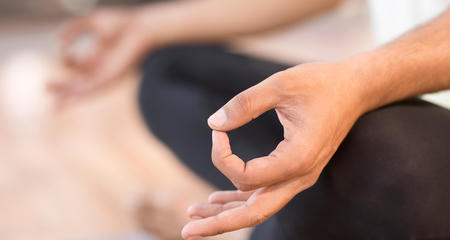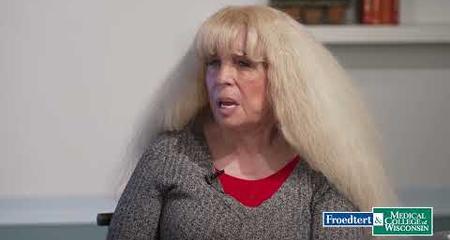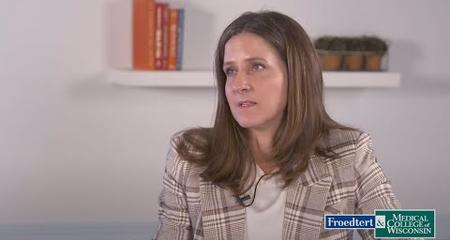If you’ve been diagnosed with cancer as a teen or younger adult, you may feel alone. But you are not: A community of patients, survivors, caregivers, researchers, nurses and medical experts is ready to help. The Froedtert & the Medical College of Wisconsin Cancer Network, the Medical College of Wisconsin and Children’s Wisconsin MACC Fund developed the Adolescent and Young Adult Cancer Program for people between the ages of 15 and 39 to help you get through cancer and beyond. Working with people like you and cancer treatment teams, we created support groups, educational programming, advocacy resources and guidance to meet your unique needs.
The Adolescent and Young Adult Cancer Program provides quality and supportive care resources from diagnosis through survivorship. Your needs may differ and may include emotional support, how to talk about diagnosis to family and friends and planning for future goals.
Download the AYA Cancer Program Booklet PDF
View the AYA Cancer Program Booklet E-Book
We focus on quality of life and practical support, including:
- Psychosocial support and spiritual care
- Sexual health considerations
- Health insurance and financial counseling
- Treatment support, including clinical trials education
- Fertility preservation counseling
- Transition to post-treatment survivorship services
How to Get Support
We encourage you to talk about your treatment, feelings and needs with your doctors, clinicians and your support network. We encourage you to connect with others who are your age who know what it’s like to go through this experience.
Need help? Contact our AYA Cancer Program via e-mail at [email protected] or speak with your care team.
Understanding Your Cancer Diagnosis and Treatment
Your first step is understanding your diagnosis, the recommended treatment plan and your options. Speak openly with your care team about any questions or concerns. Ask questions and have conversations with your health care team and loved ones. This will get you the best care possible. You are the most important person in the room.
Make sure you understand. Was your diagnosis, treatment plan, prognosis and recovery explained to you clearly?
- Ask questions about the impact of treatment on fertility and access to fertility preservation options at the time of diagnosis.
- Participate as a member of your care team to help coordinate and make decisions for your treatment. Ask for a full explanation of all treatment options along with short- and long-term effects.
- Use psychosocial and/or community support (e.g., psychology, social work, child life, financial counseling, and palliative care).
- You have the right to feel respected and taken seriously without judgment of culture, preferences, spiritual beliefs, social or personal values.
- Ask questions about advance care planning (living will, advance directive, power of attorney)
- It is ok to ask for privacy during a discussion or an examination. You have the right to ask anyone to leave the room if you feel uncomfortable.
- Ask your care team what clinical trials are available for you as a teen or younger adult patient.
- Ask to connect with other patients in your age group who have similar experiences.
- Consider a second opinion: A second opinion is when a doctor other than your primary one reviews your medical chart and test results to give you a diagnosis and treatment recommendation. A second doctor's opinion may turn out to be the same as your primary or it may suggest a different approach or include additional recommendations. By seeking a second opinion, you will become more informed about all of your available treatment options to help you make the best decision for you.
Ask Your Doctor "Is There a Clinical Trial for Me?"
You might be eligible for different clinical trials. Ask your care team for help determining your options.
A clinical trial provides eligible patients with the chance to receive additional treatment using the latest medicine, technology and approaches available in cancer care. Your contribution as a clinical trial participant helps cancer researchers and your care team gain potentially life-saving knowledge about how to treat your type of cancer.
Clinical trials are not random experiments. They are highly controlled studies that aim to improve cancer treatment outcomes. While not guaranteed, every breakthrough in available cancer treatments started as a clinical trial.
Some clinical trials are called interventional and involve testing a treatment or combination of treatments, while others are observational - researchers observe patients on their current treatment plans and track health outcomes. Still others aim to improve quality of life. Learn the basics about clinical trials.
Consider exploring the clinical trial websites below.
Common Concerns During and After Cancer Treatment
Everyone with a cancer diagnosis has questions, but they can differ depending on the stage of your life. Common topics you might want to talk about include the following.
Sexual Health
Cancer treatment can impact your sexual health, sexuality and how you feel about being intimate. Having concerns about any or all of these topics is normal and ranks high on the list of most common concerns for adolescents and young adults with cancer. The Froedtert & MCW Cancer Network offers a Cancer Sexual Health Program to address questions, concerns and, if needed, treatment.
Write down your questions ahead of time. If you feel nervous, practice your questions out loud. If it would help, bring someone along to support you.
Here are a couple conversation starters:
- I have a personal question I would like to talk to you about...?
- I have symptoms I’d like to talk about that are affecting my sexual health...?
Body Image/Self-Image
- Physical body changes
- Changes in menstrual cycle
- Pain, discomfort or physical limitations
- Fatigue
- Sadness or depression
- Hormone changes
Dating and Relationships
- Intimacy
- Vaginal dryness
- Getting or maintaining an erection
- Libido (changes in desire or interest)
- Safe sex/birth control
Planning for and Preserving Your Fertility
Cancer treatments, including radiation and chemotherapy, can impact fertility. Fertility is defined as the ability to conceive (or make) a baby.
Fertility preservation options are available to women and men to increase the chance of becoming pregnant or fathering a child naturally after cancer treatment. These options work best when they are done before cancer treatment starts. The first step is to talk to your health care team and share your thoughts about your future.
Families come in all shapes and sizes, and cancer survivors become parents in many different ways. The pathway to parenthood may include natural conception, using your own preserved eggs or sperm, using egg or sperm donors, using surrogates and adoption.
Fertility resources, educational materials and videos are available to help you make decisions that are best for you. More information about fertility options is available at:
- Froedtert & MCW Reproduction Medicine Center
- Children's Wisconsin Fertility Navigation Program
- Oncofertility Consortium (savemyfertility.org)
Resources to Support You
We understand that cancer is different when you are a teen or younger adult. Our resources are designed to support you throughout your entire cancer experience. We offer different programs and services to help empower you during your cancer experience through emotional, mental and physical well-being. Our goal is to incorporate wellness for your full body. There are opportunities at our hospitals to help you feel your best. We also work with community organizations to bring wellness programming to our patients. Visit our cancer support page for information.
Connections with others going through cancer. Imerman Angels is a national resource connecting people fighting cancer with a survivor of the same cancer. The program also connects caregivers.
Nutrition Services. Many people benefit from the help of a dietitian for healthy eating and nutrition guidance during cancer treatment. Your doctor may suggest you see a dietitian as part of your cancer treatment plan, or you may request a referral or consult by talking to a member of your care team.
Physical and Occupational Therapy Services (Rehabilitation Services). Occupational and physical therapists are available to help you with cancer-related fatigue, decreased strength, decreased endurance and mobility, balance problems, chemotherapy-induced neuropathy and lymphedema management. If you have questions, talk with your doctor or clinician about an order to see an occupational or physical therapist.
Small Stones Wellness Centers provide wigs, skin care, make-up consultations, health and wellness classes, and mind-body treatments for cancer patients and survivors.
Healing Haven of Wisconsin is a private clinic designed to guide you through medical hair loss by helping you rebuild your look, style and confidence in a one-on-one setting or with your support team.
Livestrong® at the YMCA.is a researched-based program designed to help adult cancer survivors (18 years and older) reclaim their health and begin their journey toward recovery. Regular participation in physical activity is important for the following reasons:
- Increases quality of life and survivorship
- Improves your mood
- Increases your sense of wellness in your body
- Increases muscle strength and tone
- Improves your endurance
- Improves your ability to complete your activities in daily life
- Helps you control your weight
- Improves circulation
- Decreases fatigue
Coping Resources
Ask your care team to connect you:
Spiritual care. Chaplains provide spiritual and emotional support for patients and families of all faith traditions. They are helpful even for families who do not have a faith tradition by assisting families during hospital stays.
Therapy dogs. Trained, certified therapy dogs offer comfort to help reduce stress in the hospital by creating a distraction from the illness and hospital procedures.
Social workers. Social workers meet with patients and families to assess needs and connect them to community resources. A social worker can help with a range of social, emotional, financial and practical needs related to the cancer diagnosis and treatment including work, school, insurance, transportation, and advance care planning. Social workers can help guide you, advocate for your situation and stay ahead of a crisis by providing the following resources. A member of your care team can place a referral for a social worker to contact you. You may also schedule a meeting or phone call with a social worker.
Call the Jeffery C. Siegel Quality of Life Center at 414-805-0572.
- Options for job and insurance protection. Examples: Family Medical Leave Act, short- or long-term disability from employer or social security disability insurance
- Transportation options
- Caregiver support or help in your home.
- Access to grant or financial aid programs.
- Mental health resources including locating a counselor or support groups.
- Advance directives (health care power of attorney and living will documents). There is no next of kin law in Wisconsin. Spouses, parents and family have no legal rights in an emergency if there are no advance directives.
Child life. Child life specialists teach healthy coping skills for patients and their families, including the siblings or children of AYA patients to build understanding and preparation for medical procedures.
Behavioral health. Behavioral health specialists provide supportive counseling and teach patients and families ways to cope with cancer-related distress. Download the ‘Managing Anxiety in Cancer’ handout.
Palliative care. Focuses on quality of life during cancer treatment. Palliative care services include emotional support and help with symptom management. They can also help with end-of-life care and bereavement.
Art therapy. Creative expression through art therapy sessions can address the mental health needs of patients undergoing cancer care.
Tips From Those Who Walked It
Others have walked your path before you did and have gathered information to help you.
- Helpful things to bring to the hospital for treatment or surgery:
- Headphones/ear buds
- Phone/tablet
- Lip balm
- Hand lotion
- Peppermint candies for nausea
- Look for small victories in every day.
- Decorate your hospital room to make it feel like home.
- Take advantage of your good days. Get outside when you can. Continue to do the things you enjoy.
- Find ways to express yourself.
- Be prepared to binge watch your favorite shows. Bring your laptop or tablet with you to the hospital.
- Build relationships with your care team members. They will be your biggest advocates.
- Reach out to other young cancer survivors.
- Know it’s okay to stay in bed for the day.
- Bring someone with you to your appointments.
- You might lose some, all or none of your hair. It’s your choice to wear a wig, hat, scarf or to just be bald. Bald is beautiful, too.
- It’s okay to show emotion. Let them out. Don’t hold them in.
- Don’t feel you need to be the strong one so that (insert person here) doesn’t worry.
- Don’t be afraid to ask for and accept help.
- Go to therapy. You’re in a life-changing situation. You may need help processing your feelings.
- Reach out to other young cancer survivors. It’s helpful to find others who are going through or have gone through similar experiences.
-
Adventure Resources
If you like nature and the outdoors, check out these resources. Most are free.
Camp Koru. An outdoor adventure camp that helps young adult cancer survivors find healing and renewal beyond cancer.
Camp Mak-A-Dream. Camp in Montana provides medically-supervised experiences for children, teens, young adults and families affected by cancer.
Camp One Step. Provides programs serving kids with cancer (up to age 19), siblings and their families, bringing them happiness, joy, connection, and support.
Epic Experience. Empowers adult cancer patients and survivors through a week-long outdoor adventures in the Colorado Rocky Mountains.
First Descents. Provides life-changing outdoor adventures for young adults (ages 18 - 39) impacted by cancer and other serious health conditions.
True North Treks. Empower young adults and caregivers affected by cancer to "find direction through connection." Focus on the connection with nature, peers and yourself through backpacking and canoeing treks.
The American Cancer Society. Focused on research to improve treatments, advocacy for lifesaving policy changes, health promotion for cancer prevention, and education to support people in every community touched by cancer. ACS has education related to healthy lifestyle, sexuality, fertility, disease specific information, treatment and survivorship education.
Look Good Feel Better. A non-medical service program that teaches beauty techniques to people with cancer to help them manage the appearance-related side effects of cancer treatment. The program includes lessons on skin and nail care, cosmetics, wigs and turbans, accessories and styling, helping people with cancer to find some normalcy in a life that is by no means normal. Live! Virtual Workshops provide a safe, convenient way to experience Look Good Feel Better from home.
Teen Cancer America. Works to improve the experience, outcomes, and survival of teens and young adults with cancer by providing facilities and programs designed especially for them in hospitals throughout the USA.
-
Career Resources
These resources empower and educate people with cancer to thrive in their workplace by providing expert advice, interactive tools and educational events. Free services include a comprehensive website, legal and insurance information, career coaching, resume review, professional development micro-grants, and national events and workshops.
-
Communication and Support Management Resources
CaringBridge. Caring Bridge offers a personal health journal during any type of health experience. It helps you build bridges and communicate to help friends and family stay connected and organize support throughout your experience.
Mylifeline.org. MyLifeLine easily connects cancer patients and caregivers with friends and family to reduce stress, anxiety and isolation. By creating your own private website, you can document your journey and receive social, emotional and practical support from friends and family throughout the treatment process and beyond.
-
Disease-Specific Resources
BMT InfoNet. BMT InfoNet is a leading advocacy program for BMT and CAR T-cell therapy patients. Pioneered a vast array of services and educational programs to help patients make critical decisions throughout their transplant.
The Leukemia and Lymphoma Society. The mission of the LLS is to cure leukemia, lymphoma, Hodgkin disease and myeloma and improve the quality of life of patients and families. The LLS provides education, support and financial support.
Sarcoma Foundation of America. The Sarcoma Foundation advocates for sarcoma patients by funding research and by increasing awareness about the disease. The organization raises money to privately fund grants for sarcoma researchers and conducts education and advocacy efforts on behalf of sarcoma patients.
-
Financial Resources
Sam Fund/Expect Miracles Foundation. This website supports young adult cancer survivors in the U.S. as they recover from the financial impact of cancer treatment. One way is by providing financial assistance in the form of grants to young adult cancer survivors.
Triage Cancer. Provides education on practical and legal issues that may impact individuals diagnosed with cancer and their caregivers. Through free, in-person and online educational events, materials, videos and state-specific resources focused on expert content related to work, insurance, disability benefits, finances, estate planning, medical decision-making and more. Free one-on-one help is available, too.
Tricia’s Troops Cancer Connection. Tricia’s Troops provides financial assistance, service coordination and supportive care to cancer patients throughout southeast Wisconsin. Focuses on the daily living challenges and out-of-pocket expenses and offers free services and supplies to local cancer fighters.
-
Support Groups
Young Adult Oncology Group. In this group, young adults share experiences, plan activities and receive peer support, advice and comfort.
Cactus Cancer Society. First and only virtual community built by, and for young adults facing cancer that provides age-appropriate support programs and resources focused on coping through creative expression and connection - all in the pursuit of making survivorship support available and accessible to those who need it, no matter who or where they are.
Elephants and Tea. Helps teen and young adult patients, survivors and caregivers know they are not alone in their fight with cancer. The elephant in the room is cancer. Tea is the relief conversation provides. The only magazine written for and by teen and young adult cancer community members telling their stories in their own words. The Elephants and Tea website showcases teen and young adult programming across multiple organizations.
Gilda’s Club Madison. Provides free emotional support, cancer education, and wellness activities to children and adults impacted by any kind of cancer and those who care for them. Offers special programs just for AYAs. Open to anyone in Wisconsin (virtual and in person).
Stupid Cancer. National nonprofit organization whose mission is to help empower everyone affected by teen and young adult cancer by ending isolation and building community. Our goal is to make cancer suck less by connecting teens and young adults to age-appropriate programs and resources like CancerCon and our social meetups.
Ulman Foundation. Dedicated to changing lives by creating a community of support for young adults and their loved ones impacted by cancer.
Dear Jack Foundation. Provides impactful programming that directly benefits teens and young adults diagnosed with cancer to improve quality of life and create positive health outcomes from treatment to survivorship for patients and their families.
Recognized as High Performing by U.S. News & World Report
Froedtert Hospital is recognized by U.S. News & World Report as high performing in three adult specialties and 16 procedures and conditions, including cancer.
Blogs, Patient Stories, Videos And Classes





